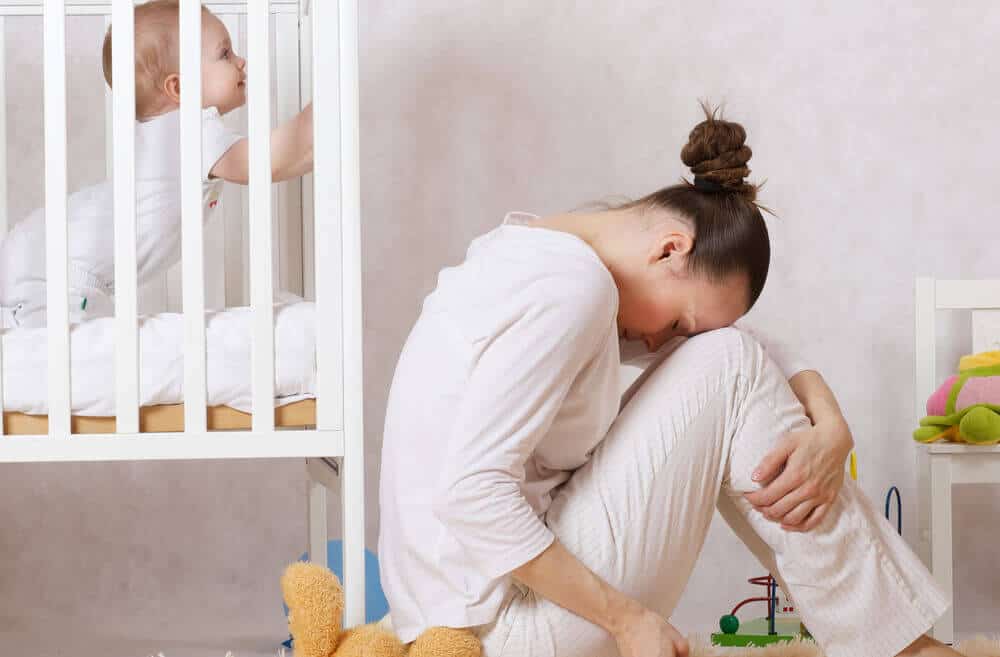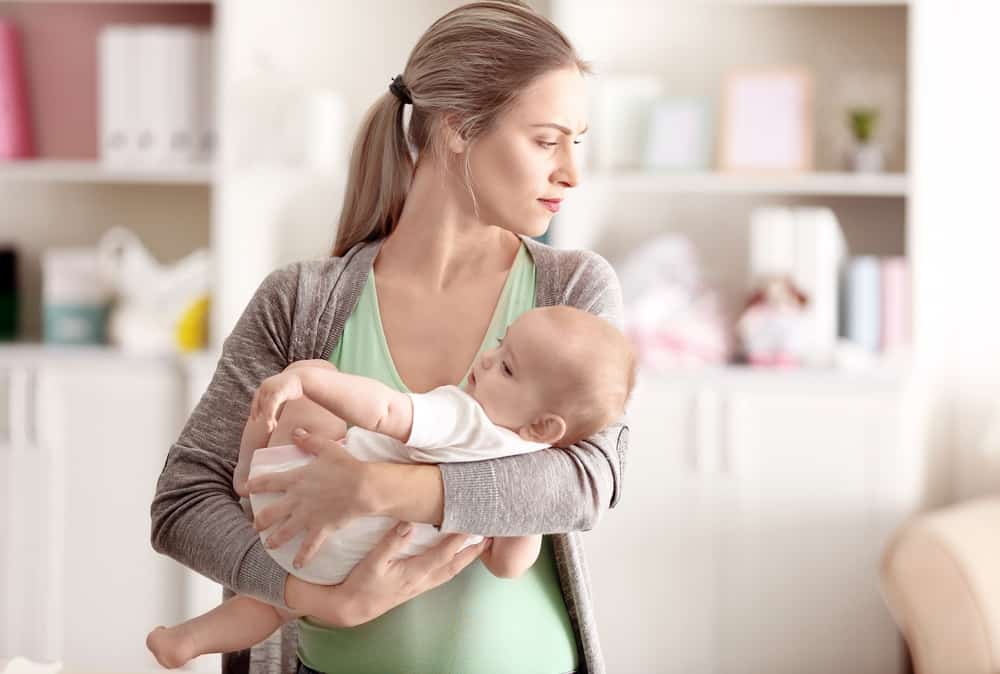The way you feel in the first few weeks after having your baby may be influenced by the baby blues, which are experienced to some degree by the majority of new mums. The baby blues often occur in the first week or so after birth, where you can feel overwhelmed by your emotions. There is nothing to worry about this phenomenon. If you get the baby blues, don’t keep it to yourself – talk about your feelings and make sure to take care of yourself by getting the rest, support and reassurance you need.
However, if these feelings last longer than two weeks or get worse, you may not only be experiencing the baby blues – you may also be suffering from post-natal anxiety. It is imperative to learn how to identify post-natal anxiety, because it is a serious condition that can negatively impact your life as well as that of your baby, and professional help and support from your healthcare provider is required as soon as possible.
Post-natal Anxiety
Post-natal anxiety refers to anxiety that arises in the twelve months following the birth of a child (it is important to note that post-natal anxiety affects both men and women). Post-natal anxiety is characterised by chronic worry and concern, and a general feeling or unease/panic. Most mothers and fathers suffering from this anxiety disorder experience feelings of extreme anxiety, sadness, and exhaustion, which may hinder them from completing daily care activities for themselves and/or for their baby/others.
After giving birth, the levels of estrogen and progesterone in a mother’s body rapidly drop. A chemical imbalance occurs in the brain that can trigger mood swings (i.e. the baby blues). Additionally, most mothers are unable to get enough rest to fully recover from giving birth. This constant sleep deprivation can cause further physical exhaustion and discomfort which can lead to/exasperate the symptoms of post-natal anxiety.
The very common baby blues are a passing period of sadness and irritability, in comparison to post-natal anxiety (which affects approximately 1 in 6 women), which lasts longer and symptoms are more severe.
Symptoms of Post-natal Anxiety
Post-natal anxiety usually does not go away without treatment. In fact, the symptoms of post-natal anxiety can develop moderately over time. Its severity normally depends on the number of symptoms suffered by the patient, their intensity and the extent to which they interfere with a mother’s (or father’s) ability to get on with their daily activities. Symptoms and their severity vary for every patient and some of these symptoms include:
- Persistent, generalised worry, often focused on fears for the wellbeing or safety of the baby
- Being nervous, ‘on edge’, or panicky
- Development of obsessive or compulsive thoughts and/or behaviours
- Persistent weepiness for no obvious reason
- Agitation and intense anger or irritability
- Feeling constantly tired and lacking energy
- Loss of interest in all activities that bring joy
- Sleeping too much
- Inability to sleep even when you’re exhausted
- Severe mood swings or attitude changes
- Having difficulty concentrating
- Withdrawing from family, friends and co-workers
- Losing interest in intimacy
- Difficulty bonding with your baby
- Engaging in risk-taking behaviour
- Having thoughts of harming your baby
- Recurring thoughts of death or suicide
Having one or more of these symptoms does not automatically mean that you have post-natal anxiety. Rather, you/your support network should be on the lookout for the following five signs that may indicate you are suffering from post-natal anxiety:
- The symptoms go on for more than two weeks after birth.
- The symptoms are getting worse after two weeks.
- The symptoms are making it hard for you to take care of your baby.
- The symptoms are making it hard for you to complete everyday tasks.
- The symptoms include thoughts of harming yourself or your baby.
If you have experienced any of these symptoms or if your partner notices them, it is very important that you immediately seek help from a medical professional.
Post-natal anxiety is not your fault and has nothing to do with how “good” or “competent” you feel you are as a parent. Thankfully, post-natal anxiety is highly treatable. The first step is to get diagnosed; don’t wait thinking that you will feel better.
Risk Factors for the Development of Post-natal Anxiety
Post-natal anxiety is diagnosed for any mother or father who meets the diagnostic criteria for anxiety disorder within one year of giving birth/arrival of a baby. Post-natal anxiety is extremely common and oftentimes goes unnoticed because many new parents believe that an increase in anxiety is just something that comes along with motherhood/fatherhood (which it does to some extent). However, when a new mother/father is experiencing extreme anxiety and is having difficulty controlling worry, experiencing irritability, finding it hard to concentrate and their sleep is disturbed, it is likely time to see an expert for some help and support.
There are a number of different risk factors that may increase the likelihood of a mother or father developing post-natal anxiety following the birth of a baby. Women at increased risk for developing post-natal anxiety include any woman who has:
- a personal history of anxiety, obsessive-compulsive disorder, depression or other mental health illness
- previously experienced antenatal anxiety or depression
- a family history of anxiety or other mental health illness
- a history of premenstrual dysphoric disorder
- an anxious personality
- been subject to domestic violence or is in an unsupportive relationship
- financial stress
- sought fertility assistance
- had a difficult labour and/or birth
- experienced sleep deprivation and exhaustion
- had difficulty re: baby’s feeding and/or sleep
If you or someone you know meet the above criteria, it is important to be evaluated by a medical expert. Consulting with a professional in the mental health field is a healthy step in the right direction – there is nothing to be ashamed of. In fact, going out, seeking help and actively working on your mental health is an indication that you are strong, not weak, because you have identified there is an issue that needs to be addressed and you are taking proactive steps towards improving your mental health.
Things You Can Do to Help You Manage Post-natal Anxiety
Every parent experiences some degree of anxiety after their baby arrives. However, if these feelings intensify or persist over time, you may be suffering from post-natal anxiety. Where this is the case, the following strategies may help you cope:
Get Plenty of Rest
Preventing and/or minimising the symptoms of post-natal anxiety can be achieved by getting the proper amount of rest your body needs to recuperate from childbearing. This is necessary both for mental and physical recovery. It can also help you cope with the exhaustion and fatigue caused by waking every night (perhaps numerous times, where applicable) to feed your child. In order to make sure that you are getting enough rest, try your best to sleep when your baby sleeps.
Maintain a Healthy, Nutritious Diet
Your body doesn’t function simply by getting enough rest. It also requires proper nutrition in the form of healthy and nutritious wholefoods, which include wholegrains, protein, fresh vegetables and fruits, as well as a sufficient amount of water. Maintaining a healthy diet plays a key part in the recovery process that follows giving birth/welcoming a new baby. A healthy diet can also supply the energy you need in order to meet the day-to-day demands of being a parent to your child. Increasing your fluid intake is also essential for your body, especially if you are breastfeeding.
Get Some Physical Exercise (where safe/approved)
In terms of anxiety reduction, exercise has been proven to be an amazing means to reduce stress and anxiety build-up. Aside from its benefit to your mental health condition, physical activity also improves productivity and overall health and wellbeing. A boost of ‘happy hormones’ called endorphins can go a long way in lifting your mood where you are struggling with post-natal anxiety. Physical exercise does not have to be an intense workout – in fact, doing household chores is considered physical exercise and can serve a wide variety of health benefits. (Before taking part in any physical activity program, be sure to first receive clearance from your doctor/any other relevant medical professional(s)).
Practise Relaxation Techniques
Practising relaxation techniques is also a great way to manage post-natal anxiety. Usually, a person who feels anxious has trouble relaxing most of the time. Knowing how to release muscle tension can be a helpful strategy – whether that involves deep breathing exercises, mindfulness meditation or repeating something positive to yourself, such as: “It’s okay, everything’s going to be alright”.
Giving yourself a little bit of time before you react significantly to a situation can help reduce the odds of a challenging situation adding to your feelings of anxiety. So, next time you feel the symptoms of post-natal anxiety coming to the surface, try to relax and practise a relaxation technique (or two), in order to avoid any further aggravation.
Reach Out to Your Family and Close Friends
Asking for emotional support and understanding from your family and friends is one of the greatest ways to combat post-natal anxiety. Recognising that you are battling some personal issues and confiding in your loved ones suggests that you acknowledge your own strengths and weaknesses, and can identify that you need some help to improve your mental health. The first step in doing so is by sharing this journey with the people you value most, as they are the ones who can truly help, support and encourage you throughout your recovery process.
Seek Professional Help
Talking to trusted family and/or friends about your post-natal anxiety is a great first step, however in the majority of cases, they are not able (nor qualified) to provide you with the information and medical feedback and assistance you need, to help you recover from post-natal anxiety. Reaching out to your loved ones only serves as a complementary method alongside seeking professional help. Be gentle with yourself, recognise that you need professional help and seek it. Of course, requesting the assistance of family and friends to locate the professional help you need can be very beneficial.
The stigma associated with post-natal anxiety has reduced in recent years, due to people being more aware of the occurrence of post-natal anxiety amongst new parents, as well as greater availability of successful treatment options.
If you are having a tough time handling and managing your emotions after giving birth/welcoming a new baby, and may be suffering from post-natal anxiety, it may be time to seek the help of a qualified and friendly mental health professional, such as a member of our team at Blissiree Pty Ltd.





